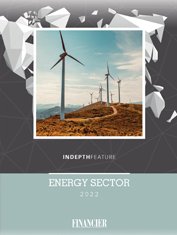INDEPTH FEATURE
Energy Sector 2022
October 2022 | SECTOR ANALYSIS
financierworldwide.com
Click cover to download
(Subscriber-only password access)
Not a subscriber?
Click here to join the FREE mailing list and receive password access
Buffeted by the coronavirus (COVID-19) pandemic, the Russian invasion of Ukraine and efforts to tackle the climate crisis, the global energy market has become a hot topic of conversation. Transformative changes have unfolded in recent years. The easing of the pandemic which curtailed energy consumption for two years has given way to a dramatic rise in energy demand as economic activity returned to pre- COVID-19 levels. The conflict in Ukraine and the intensifying cold war with Russia have increased pressure on governments to address energy security and sovereignty.
UNITED STATES
Dentons US LLP
“We are in the middle of the biggest energy crisis we have ever faced. The most significant mega-trend is a jagged transition from globalised energy markets with relatively low fuel prices and an orderly sense of energy supply to a geopolitical cold war with Russia and a highly unstable relationship with China, which has caused energy inflation for all fuel categories and has made energy security a national imperative. Simultaneously with this trend, there is a realisation that we need to move at warp speed to decarbonise.”
CANADA
Burnet, Duckworth & Palmer, LLP
“In the last 12-18 months, the Canadian oil & gas sector has been marked by a significant amount of consolidation and soaring crude oil and natural gas prices. Higher prices have bridged the price gap between buyers and sellers, although a significant portion of the consideration changing hands has been in the form of non-cash consideration, such as shares. The abrupt increase in global demand for oil & gas brought on by the post-coronavirus (COVID-19) pandemic economic recovery, the Russian war on Ukraine and limited Organization of the Petroleum Exporting Countries (OPEC) spare capacity, coupled with years of declining investment in the sector, have caused prices to increase dramatically.”
UNITED KINGDOM
L.E.K. Consulting
“The UK energy sector faces three key challenges that it continuously tries to balance: security of supply, affordability and decarbonisation. Over the last three years, each of these elements has been in the spotlight. UK supply security has weakened with North Sea oil & gas production in long-run decline, combined with reduced exports from Russia creating shortages in the gas market. At the same time, electricity generation has been stretched by the aging nuclear fleet, and capacity constraints in the electricity distribution network are occurring.”
REPUBLIC OF IRELAND
Matheson
“The war in the Ukraine has had a significant effect on all aspects of the Irish energy sector, most notably material increases in supply chain costs. The higher auction prices for the second Renewable Energy Support Scheme (RESS) in April 2022 compared with the first RESS in 2020 is further evidence of those increases. The National Energy Security Framework was published in April 2022 to address Ireland’s recent energy security needs, with a focus on accelerating Ireland’s development of indigenous renewable energy sources.”
NETHERLANDS
CMS
“The reduction of Russian gas and rising energy prices are at the top of the Dutch political agenda. Natural gas is a key fuel for industry and for building heating. Combined with the phasing out of gas production from the Groningen field, one of the world’s largest gas fields, due to strong public and political pressure, the war in Ukraine has led to a broad package of measures to prevent gas shortages over the coming winter, including energy saving measures, the development of new liquified natural gas (LNG) facilities, and filling up the Dutch gas storage facilities.”
GERMANY
Latham & Watkins LLP
“The German energy market is currently in the most difficult state since the oil crises in the 1970s. Russia’s war against Ukraine has made Germany’s heavy dependence on Russian energy imports apparent. Since the outbreak of the war, the new federal government, which has been in office since December 2021, has encountered the enormous task of obtaining fossil fuels from other producing countries. In addition, the short-term reduction of energy consumption is an essential part of the German government’s strategy. Special efforts are necessary in the transport and building sectors, which depend disproportionately on oil and gas.”
ROMANIA
PwC Romania
“Trends in the energy sector are shifting to cope with the current, atypical circumstances. Of course, renewable energy sources represent an answer to both expected trends and to the current situation. To secure energy for both the population and industries, certain measures had to be postponed or stopped, but others went ahead as planned with some delays. In Romania, the government develops strategies and plans for the sector, such as the implementation approach and monitoring for the National Energy and Climate Plan (NECP), development of the long-term energy strategy, development of a national hydrogen strategy and, with the European Commission’s (EC’s) support, significant energy transition projects, such as decarbonisation of the biggest fossil fuel energy producer in Romania.”
AUSTRALIA
Norton Rose Fulbright Australia
“The Australian energy sector is in a ‘once in a generation’ transformation, and not a moment too soon. The slow build-up of renewables now has unstoppable momentum. With it, the dynamics of energy supply have been turned upside down, with small-scale domestic solar being an example of a transformation which is a victim of its own success – with massively distributed and atomised distribution bringing unforeseen difficulties for the grid. Simultaneously, the accelerated shut down of coal-powered electricity, a trend perhaps paused by the Russian invasion of Ukraine, but one which will certainly resume, creates an opening for renewable power.”
CONTRIBUTORS
Burnet, Duckworth & Palmer, LLP
CMS
Dentons US LLP
L.E.K. Consulting
Latham & Watkins LLP
Matheson
Norton Rose Fulbright Australia
PwC Romania


